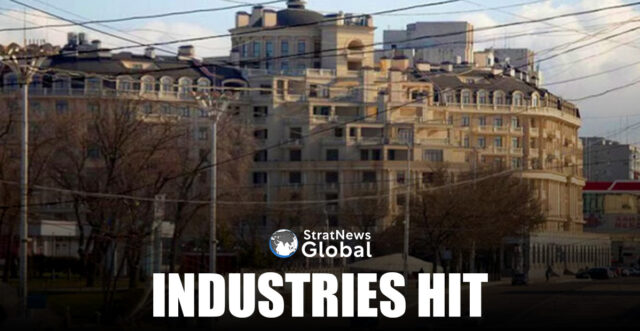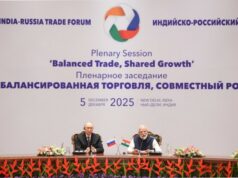The disruption of Russian gas supplies to Moldova’s pro-Russia breakaway region of Transdniestria has led to the shutdown of all industrial companies, except food producers, an official stated on Thursday.
The mainly Russian-speaking territory of about 450,000 people, which split from Moldova in the 1990s as the Soviet Union collapsed, has suffered a painful and immediate hit from Wednesday’s cut-off of Russian gas supplies to central and eastern Europe via Ukraine.
“All industrial enterprises are idle, with the exception of those engaged in food production – that is, directly ensuring food security for Transdniestria,” Sergei Obolonik, first deputy prime minister of the region, told a local news channel.
“It is too early to judge how the situation will develop. … The problem is so extensive that if it is not resolved for a long time, we will already have irreversible changes – that is, enterprises will lose their ability to start up.”
Ukraine had allowed Russia to keep pumping gas across its territory despite nearly three years of war, and was earning up to $1 billion a year in transit fees. But Kyiv refused to renew a five-year deal that expired on Wednesday.
European gas buyers such as Slovakia and Austria had prepared for the cut-off by securing alternative supplies. But Transdniestria – despite its ties to Moscow and the presence of 1,500 Russian troops there – has been crippled.
The local energy company cut heating and hot water to households on Wednesday, and urged families to keep warm by gathering in a single room, covering windows with curtains or blankets and using electric heaters.
Gas Reserves
The leader of pro-Russian Transdniestria, Vadim Krasnoselsky, said the region had gas reserves that could last for 10 days of limited usage in northern parts and twice as long in the south.
He said the main power plant had switched from gas to coal and should be able to supply electricity to residents in January and February.
Russia had been pumping about 2 billion cubic metres of gas per year to Transdniestria – including the power plant which also provided energy for the whole of Moldova, a country of 2.5 million people that wants to join the European Union.
Moldova has a long history of gas payment disputes and tense relations with Russia. The ex-Soviet republic is trying to cut energy consumption by at least a third and import more than 60% of its needs from neighbouring Romania.
The head of Moldovan national gas company Moldovagaz, Vadim Ceban, said his company had told the gas distribution company in the separatist enclave, Tiraspoltransgaz, that it was willing to help purchase gas from European countries to ease shortages.
But any gas supplied to the region would have to be paid for at market prices, he told TV8 television. Transdniestria has for several years paid nothing for supplies from Russian gas giant Gazprom, under a tacit understanding with Moscow.
Ukrainian President Volodymyr Zelenskyy has described the end of Russian gas transit as “one of Moscow’s biggest defeats” and urged the United States to supply more gas to Europe.
Since Moscow’s full-scale invasion of Ukraine, Europe has slashed its dependence on Russian energy and increased imports from other sources including piped gas from Norway and liquefied natural gas from the U.S. and Qatar.
In a statement on Thursday, Russian Foreign Ministry spokeswoman Maria Zakharova said the loss of Russian gas was hurting Europe economically, and the U.S. was the beneficiary.
“Responsibility for the cessation of Russian gas supplies lies entirely with the United States, the puppet Kyiv regime, as well as the authorities of European states that sacrificed the wellbeing of their citizens for the sake of providing financial support for the American economy,” she said.
(With inputs from Reuters)





